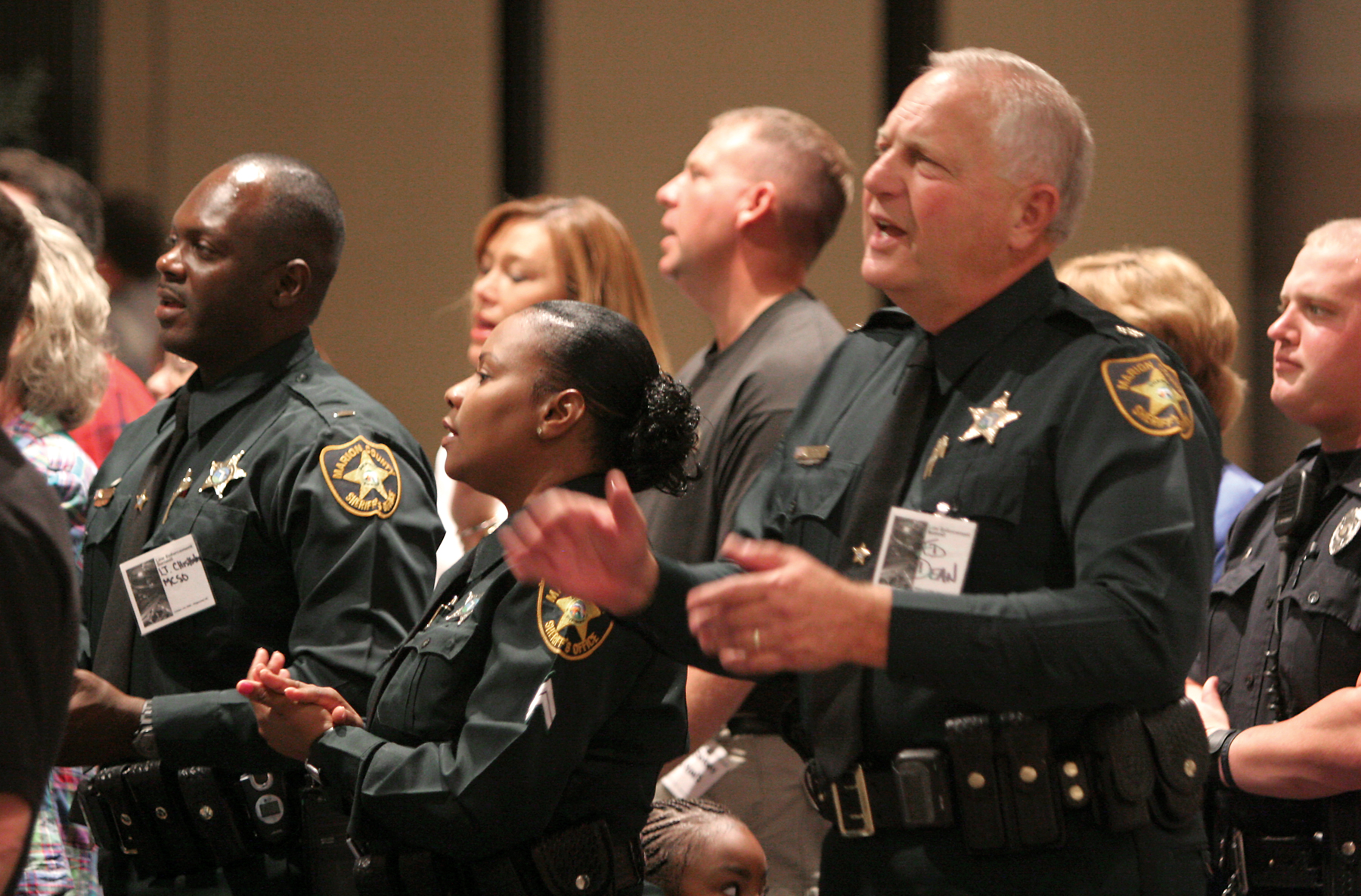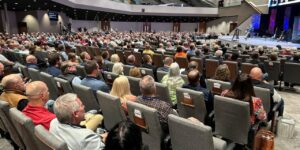
RIDGECREST, N.C. (BP)–Cops and church people both have a skewed view of the world.
“Cops look at the world and think about 90 percent of people are bad; church members look at the world and think about 90 percent are good,” said Jack Poe, chaplain with the Oklahoma City Police Department. “Neither view is accurate, but we all base our actions on our perceptions.”
Poe joined other chaplains, officers and spouses at a Law Enforcement Summit sponsored by and held at LifeWay Ridgecrest Conference Center near Asheville, N.C., Oct. 4-6. The conference center is owned and operated by LifeWay Christian Resources of the Southern Baptist Convention.
“For a law enforcement officer, it’s hard to not look at everyone with suspicion,” Poe said, since that can mean survival on the job. Church members, however, look at people and “want to give them the benefit of the doubt and wonder why cops have to be so harsh.”
The public may look at law enforcement officers as rough, tough and hard, Poe said, “but based on my years of involvement with the police department, I think I am accurate in saying that there is a higher percentage of Christian law enforcement officers than Christians in other fields. They almost have to have that spiritual connection to survive.”
Poe told the officers that law breaking began with Adam and Eve. “They only had one rule -– one rule -– and they broke it,” he said. “It started there. People still want to break the laws and regulations they are given. But without these laws and regulations, we descend into chaos.”
OFFICERS’ CALLING
Tim Eldred, chaplain for the Rutherford County (Tenn.) Sheriff’s Office, joined Poe in talking with the officers about the calling of a law enforcement officer.
“You are called to your job as much as I am called to mine,” Eldred said.
Using the picture of sheep and shepherds, Poe compared law enforcement officers to the sheepdogs. “In God’s purpose, we are sheepdogs of an assigned flock of sheep, aware and trained to look out for and protect those that the wolves intend to destroy or devour,” he said. “We are the sheepdogs, the warriors, out there to sacrifice ourselves, if necessary, to protect those sheep.”
Billy Perry, a detective and SWAT team leader from the Jacksonville (Fla.) Sheriff’s Office, continued with the sheepdog metaphor. “The first defense is our presence. Just us being there can deter the wolves.”
He noted two things officers have to remember as sheepdogs. “First, don’t let the wolves get to the sheep when you’re in charge. We need to use our bark first, but we have the teeth, the bite, and will use it when necessary. Second, don’t turn on the sheep you are required to protect.”
Poe said the law enforcement officer’s job is to stand in the gap between the public and those who want to hurt others. “For people, their safe place is behind us. Romans 13 tells us that we are the warriors ordained by God.”
OFFICERS AS SAMARITANS
Using the story of the Good Samaritan, Poe compared the officers to the Samaritan. “The Good Samaritan stayed focused on his task, but don’t you know he also counted the cost?” Poe said. “I’m convinced that at some point, he must have been tempted to dump the victim off his donkey and just walk away. Have you ever been tempted to dump someone off your donkey? Someone that just wouldn’t listen to you, who kept doing the same stupid thing over and over? Sure!
“But the Samaritan was moved by compassion and he made the right choice,” Poe said. “And we have to make the right choices. Our destiny is not a matter of chance; it’s a matter of choice.”
OFFICERS AS PROTECTORS
Richard Land, president of the Southern Baptist Ethics & Religious Liberty Commission and author of the newly published book, “Imagine! A God Blessed America” published by Broadman & Holman, spoke to the officers for a second straight year.
Land told the officers that they fill a crucial role in society. “I don’t have the right to take justice into my own hands. You are the protectors. [When there is a problem,] I expect you to come and put [the lawbreakers] in jail. Then I expect the government to execute justice.”
The problems of America are of the heart, he said, and too often law enforcement officers are forced to deal with the result of troubled homes. “Eighty percent of the people in prisons come from fatherless homes. Boys who grow up in fatherless homes are 300 percent more likely to get in trouble with the law.”
OFFICERS’ FAMILIES
Tim Hawsey, a career law enforcement officer who served as moderator of the summit, and his wife, Diana, led a conference for officers and their spouses on the stresses of being a law enforcement family.
“We don’t have the most physically dangerous job, but emotionally, we have the most dangerous job in the world,” said Hawsey, assistant police chief in Flomaton, Ala., who also serves as minister of music and youth at First Baptist Church in Bratt, Fla., just across the state line. The pressure is multiplied, he said, because the officer’s family can’t help but be a part of the job, especially in a small town.
“You get the officer’s children going to school with the children of a drug dealer the officer arrested,” he said. “You may have a SWAT team member who had to kill the father of some of his children’s friends. At the grocery store you might see someone you arrested and who threatened you or your family.”
It’s in the nature of an officer to want to be where the action is, Hawsey said. “It’s always a temptation to run out and work that wreck or robbery when you aren’t on duty, or work more hours for the overtime, but you need to have someone in your life who will stop you and remind you to have a responsibility to your family. You need that quality time at home.”
Next year’s Ridgecrest Law Enforcement Summit will be Oct. 3-5. For more information, go to www.lifeway.com/ridgecrest.
–30–















